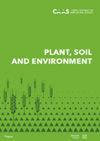Nitrogen mineralization from rice straw and cow manure with various moisture conditions in organic paddy fields
IF 1.8
3区 农林科学
Q1 AGRONOMY
引用次数: 0
Abstract
Nitrogen is an essential element, which can come from mineralization of organic N in plant residues. The measurement of nitrogen mineralization is important for estimating nitrogen availability and determining fertilizer requirements. This study aims to evaluate N mineralization of straw and cow manure in organic paddy fields at different water conditions through laboratory incubation. Types of paddy field management (organic, semi-organic, and conventional), organic matter (straw and cow manure), and moisture conditions (aerobic and anaerobic) were used in these research. The NH4+ and NO3ˉ concentration, soil pH, and water content were measured eight times over 56 days of incubation. Microbial biomass was measured at the end of the incubation. The data were analyzed using three-way ANOVA followed by the DMR and Pearson correlation test. Results showed that the application of cow manure on organic paddy fields in anaerobic conditions increased NH4+ up to 18.56 mg kg-1 and increased NO3ˉ in aerobic conditions up to 7.71 mg kg-1 from the initial concentration. Organic paddy fields with cow manure input under anaerobic conditions have the highest N mineralization potential. The N mineralization rate of straw and cow manure in organic paddy fields under anaerobic conditions was not significantly different. For 8-week incubation, adding straw in organic paddy fields increased NH4+ by 109% and NO3ˉ by 14%, whereas cow manure increased NH4+ by 128% and NO3ˉ by 18%. Application of plant residue or manure is an effective strategy to enhance soil microbial biomass and soil N availability and has the potential to reduce the dependence upon chemical N fertilization.不同水分条件下有机稻田秸秆和牛粪的氮矿化
氮是一种必需元素,主要来源于植物残体中有机氮的矿化。氮矿化测量对估算氮素有效性和确定肥料需要量具有重要意义。本研究旨在通过室内培养,评价不同水分条件下有机稻田秸秆和牛粪的氮矿化。稻田管理类型(有机、半有机和常规)、有机质(秸秆和牛粪)和水分条件(好氧和厌氧)均被用于研究。在56 d的培养过程中,测定了8次NH4+和NO3 +浓度、土壤pH和含水量。在孵育结束时测量微生物生物量。数据分析采用三向方差分析,然后采用DMR和Pearson相关检验。结果表明,在厌氧条件下施用牛粪可使有机水田NH4+较初始浓度增加18.56 mg kg-1,而在好氧条件下施用牛粪可使NO3 +较初始浓度增加7.71 mg kg-1。在厌氧条件下,施用牛粪的有机稻田氮矿化潜力最高。厌氧条件下有机稻田秸秆和牛粪氮矿化率无显著差异。在8周的培养过程中,在有机水田中添加秸秆可使NH4+和NO3 +分别提高109%和14%,而牛粪可使NH4+和NO3 +分别提高128%和18%。施用植物残茬或肥料是提高土壤微生物生物量和土壤氮有效性的有效策略,并有可能减少对化学氮肥的依赖。
本文章由计算机程序翻译,如有差异,请以英文原文为准。
求助全文
约1分钟内获得全文
求助全文
来源期刊

Plant, Soil and Environment
Agronomy, Soil Science-农艺学
CiteScore
4.80
自引率
4.20%
发文量
61
审稿时长
2.4 months
期刊介绍:
Experimental biology, agronomy, natural resources, and the environment; plant development, growth and productivity, breeding and seed production, growing of crops and their quality, soil care, conservation and productivity; agriculture and environment interactions from the perspective of sustainable development. Articles are published in English.
 求助内容:
求助内容: 应助结果提醒方式:
应助结果提醒方式:


